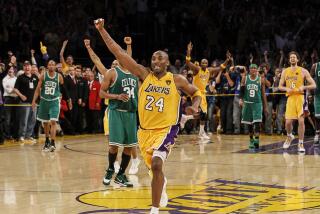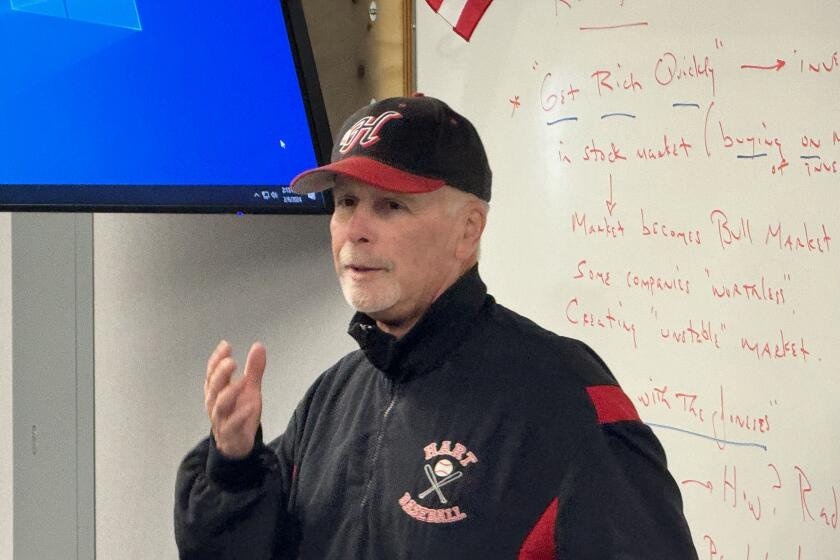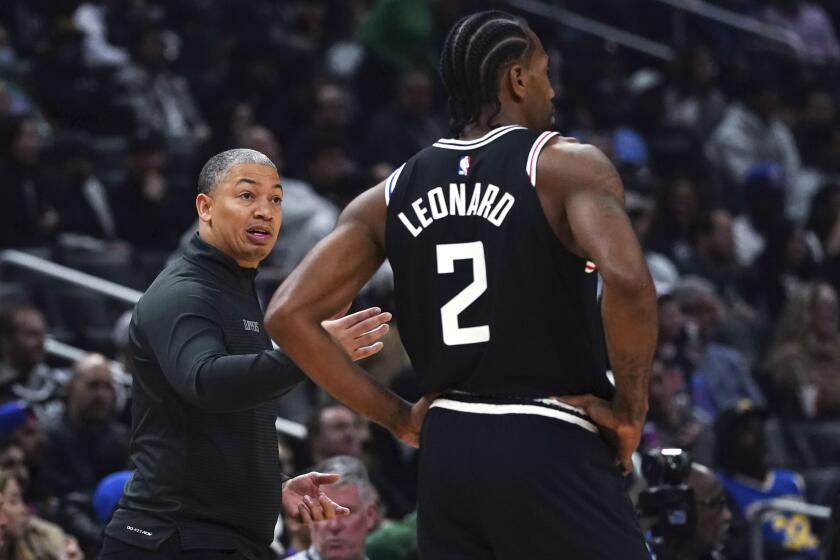Bernie Bickerstaff’s long journey through life makes time with Lakers special
He sits on the second row. The moment he gave up the throne, he moved back to the second row. It suits him there. His journey makes sense from there. He is as close to the ushers as the superstars. He is midway between his deepest roots and wildest dreams.
“I’m the guy you look at and say, ‘Oh,’ ” said Bernie Bickerstaff, his gap-toothed smile widening. “You see me and say, ‘Oh, him.’ I’m the forgotten guy. I’m the guy who just does his job.”
In a young Lakers season dominated by coaching narratives, the most compelling cannot be found along the beach with Phil Jackson, or on crutches with Mike D’Antoni, but in that second row, in the thick mountain drawl of the gray-haired man who traveled unimaginable miles to get there.
Bernie Bickerstaff will celebrate Thanksgiving with the greatest winning percentage of any former Lakers coach, and you laugh, and he laughs, but those five games he served as the interim boss between Mike Brown and D’Antoni were a triumphant lap in a lifelong trip across a landscape of poverty and racism.
In quieting Lakers chaos and leading them to a 4-1 record that may eventually represent four of the most important wins of the season, Bickerstaff traveled from a Kentucky mining hollow to Hollywood. From a gravel court and coat hanger rim to Staples Center. From childhood outhouses to basketball’s penthouse.
“Growing up the way I grew up, you get through all that, this is like candy,” he said.
When he gives thanks today, Bickerstaff, 68, will marvel how a black child who was forbidden to eat or drink with whites could lead a team that dazzles a huge diverse fan base. He will ponder how a black child who was ordered to walk quietly to the back of every bus could stalk the most glittering of NBA sidelines.
He grew up in a tiny house with no plumbing or phone in a Benham, Ky., neighborhood that was called, “colored town,” yet suddenly he was leading a team with the most royal colors in sports? As a player for a tiny junior college in Ohio, he was benched for being black, yet now he was ordering the benching of some of the greatest players on one of the grandest stages in sports?
Oh, him? Yeah, him.
“Bitterness is kind of a wasted emotion, isn’t it?” Bickerstaff asked. “You never forget, but you ride it out in a different way.”
In a 10-day period, he took over an unhappy team with a 1-4 record and rode out his tenure with uncommon humor, humility and grace. He began his first news conference with feigned shock and a loudly whispered expletive at the number of cameras. He promptly announced that, “I just want to stay out of the way.” He joked about being “day to day” and being paid in popsicles. The organizational relief was palpable.
He was the perfect man for the impossible situation, seamlessly bridging the gap between the shock of the Brown firing, the disappointment at the failure to hire Jackson, and the uncertainty over the arrival of D’Antoni.
“He is the consummate professional,” said Kobe Bryant, the consummate professional who can offer no bigger compliment.
By Monday, with D’Antoni set to coach his first game, Bickerstaff had already virtually disappeared, slipping back into the anonymous role of a sage, quietly roaming the practice floor with notes on a card stuck in the front of his sweat pants.
“Who knows, maybe eventually I’ll get a couple of popsicles,” he said.
There is a reason Bickerstaff refers to popsicles as if they were gold. At one point in his life, they were. After his mother moved to New York to find work, he was reared by his grandparents in a tiny house owned by International Harvester, which ran the nearby coal mine where his grandfather worked for 35 years before the job killed him.
“He got a gold pin and black lung,” said Bickerstaff.
His family not only struggled with things like coal heaters and outhouses, but also with 1940’s era segregation. Bickerstaff never regularly mixed with whites until after he graduated from an all-black high school with a class of 14. He engaged in fights with kids who called him names while learning to adjust to adults who acted like he didn’t exist. Then there was the day when, as a star basketball player, he leaned into the all-white stands while chasing a loose ball in a basketball game against a team from a nearby mountain community.
Wanting to test the local belief that blacks had tails, one fan pulled down Bickerstaff’s pants.
And he’s going to sweat a Dwight Howard missed free throw?
“My background taught me all about the adjustments that I would later make with players,” said Bickerstaff. “It made you mentally tough in terms of how you had to deal with stuff.”
Worried about benching millionaire athletes? While attending Rio Grande Community College in Ohio, Bickerstaff would be benched for white players when the team traveled to their hometowns. Worried that he can’t handle the Laker heat? One summer he quit school to work at a Cleveland steel mill.
“My grandparents taught me simple things that still work today,” he said. “Loyalty, honesty, hard work.”
After quitting Rio Grande because of things like the benching incidents, he climbed into a car and drove to Southern California, where his life changed at the University of San Diego. In a diverse environment, he was allowed to thrive, both as a basketball player and as a leader. He graduated and soon became the school’s head coach, the youngest college coach in the country at age 25.
He eventually wound up as an assistant with the Washington Bullets, and was considered one of the bright minds of the league, but it took him a dozen years to get a head coaching job because NBA executives were still a bit skittish about a black head coach. He was finally given a break in 1985, being hired in Seattle by a former black head coach, Lenny Wilkens.
For parts of 13 seasons, he has been the head coach for four different franchises — Seattle, Denver, Washington and Charlotte. He came to the Lakers with a 427-538 record that is considered as reflective of his rosters — he was the first coach for the expansion Bobcats — as his coaching ability.
When he was asked by General Mitch Kupchak to replace Brown moments after the coach was suddenly fired, Bickerstaff shrugged and said fine. The Lakers loved him, averaging 103.8 points a game during his tenure, a figure which would currently lead the league. And now that it’s over? Now that his moment of national glory has come and gone in seemingly seven seconds or less?
“The one person I’ve got to be all right with is me, and I’m OK with me,” said Bickerstaff. “There’s no levitating here. I’m going to keep my feet on the ground and enjoying everything around me.”
No levitating, indeed. He has been married for 46 years with five children and 12 grandchildren, including a son who is an assistant coach for the Houston Rockets. He has left the glitz of the beach for Hancock Park. He drives to work every day on surface streets listening to jazz and not talking on that, “necessary evil” he calls a cellphone.
And, oh yes, he returns to “colored town” in Benham every year to put flowers on his grandparents’ grave. While he’s there, he will drive down Bernie Bickerstaff Boulevard, maybe the most important street named after a sports figure anywhere.
“You have to drive on it, it’s the only damn street in town,” he said.
He will end up this summer at his Washington, D.C., home where there will be another memento to remind him of his journey. In prominent display in his home, in a large glass frame, is a giant lump of coal.
He was once defined by it. Now he is defined by the diamonds he created from it. The Lakers can be thankful they are among them.
Twitter: @billplaschke
More to Read
Get our high school sports newsletter
Prep Rally is devoted to the SoCal high school sports experience, bringing you scores, stories and a behind-the-scenes look at what makes prep sports so popular.
You may occasionally receive promotional content from the Los Angeles Times.







